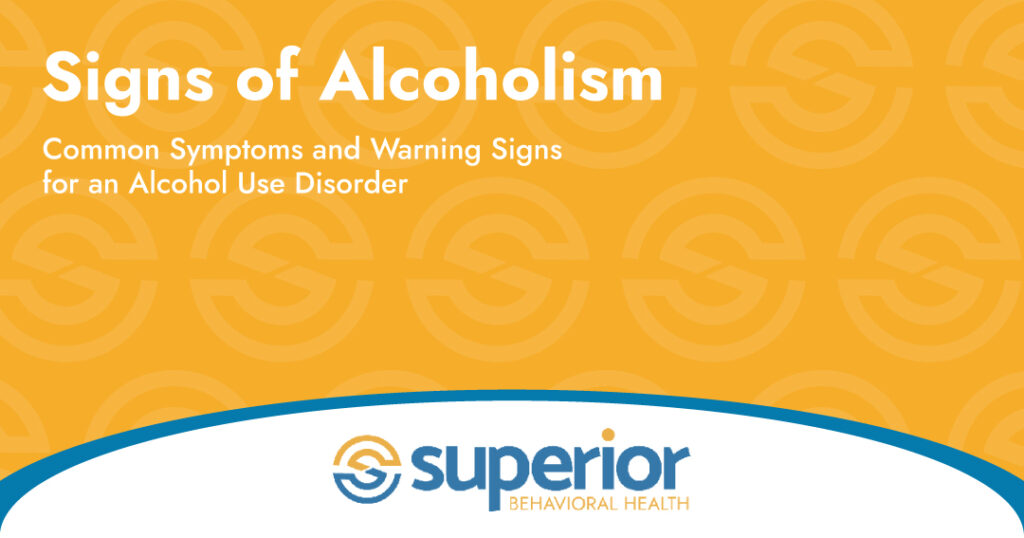Drinking is fairly normalized, especially in rural areas. People often have a beer after a long day of work, at a barbecue, and at sporting events. If someone asked you when casual drinking becomes alcoholism, would you be able to answer them?
The signs of an alcohol use disorder aren’t always as glaring as people may think. Many symptoms are gradual and go undetected.
Here at Superior Behavioral Health, we are open and honest about the signs of alcohol use. Lowering the stigma and providing educational and easy-to-access information can help people make informed decisions about their drinking and health. We offer same-day appointments, so if you or someone you love is displaying some of these common signs of alcoholism, don’t hesitate to reach out.
Common Symptoms and Warning Signs for an Alcohol Use Disorder
Here are a few common signs to look for that might indicate you or someone you care about is living with an alcohol use disorder:
- You/they stop attending events they used to enjoy
- You’re/they’re drinking more than usual
- You’re/they’re spending a large amount of the day either drinking or recovering from drinking
- Your/their relationships/family life/job is being negatively affected by drinking
- When not drinking, you/they experience withdrawal symptoms such as agitation, tremors, headaches, vomiting, and more
If you notice these signs in yourself or a loved one, it might be time to reach out for support. No one is alone, and there are people who want to help.

The True Statistics of Alcohol Use in Ohio
Here’s how alcohol use impacts Ohio citizens.
- Over 83,000 kids aged 12-17 reported past-month alcohol use
- 22% of men and 13% of women reported heavy/binge drinking at least once in the past month
- Nearly 500,000 young adults reported binge alcohol use in the past month, which is higher than the national average
How Long-Term Alcohol Use Impacts the Brain and Body
Binge drinking and long-term alcohol use can and will impact the body. While some side effects of alcoholism are reversible with proper care, others can lead to lifelong damage or an increased risk of cancer.
Mental Signs of Alcohol Regular Alcohol Use
Long-term alcohol misuse is shown to impact several ways of your brain functioning. It can impact concentration, coordination, and memory.
Physical Signs of Habitual Alcohol Use
Alcohol impacts more than just the liver, especially with long-term or binge use. Over time you can experience reduced bone density, increased risk of stroke, hypertension, cardiomyopathy, fibrosis, muscle wasting, gut leakiness, and more.
The liver, especially, can become increasingly more damaged over time. This usually starts with steatosis (otherwise known as fatty liver) and can develop into fibrosis, cirrhosis, and alcoholic hepatitis. The liver will slowly develop more scar tissue, which further stresses the organ and could lead to liver failure.

Where to Find Treatment for Alcoholism in Ohio
If you’re looking for options for recovery from alcohol use disorder, Superior Behavioral Health is here for you. Taking the steps towards healing can seem hard, but our team is ready to help. We offer everything from inpatient and outpatient services to partial hospitalization programs and mental health services.
We will work with you to make a treatment plan that suits your specific needs. We want to help support you so you can reach your long-term recovery goals. Reach out today at 216-435-1110 and our Superior team will help get you started.
FAQs About Signs of Alcoholism
What are the signs that I’m an alcoholic?
If you find yourself withdrawing from activities you used to enjoy, having stress in relationships due to drinking, and most of your day is consumed with thoughts of drinking/drinking/the after-effects of drinking, you might have an alcohol use disorder.
What are the 4 levels of alcoholism?
Alcoholism starts with experimentation, then it moves on to more regular drinking, and from there, it progresses towards consistent drinking, especially using drinking to cope. Often, the third stage a person spends more time being impacted by drinking than not. The fourth stage is when it’s well beyond their control. It’s very negatively impacting their life physically and socially. This is often where people hit rock bottom.
What are 3 signs a person has a drinking problem?
Common signs include needing more to drink to feel the same, spending most of your time thinking about drinking, actually drinking, recovering from drinking, and withdrawing from activities you used to enjoy in order to drink.


